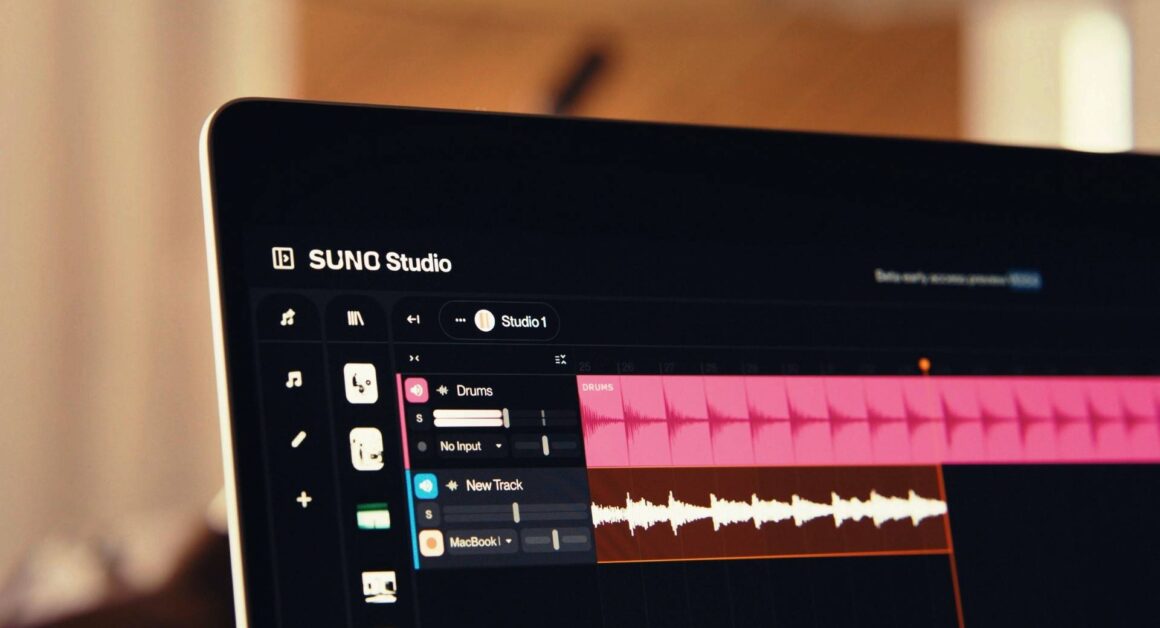A Bold Release at the Worst Time
Suno Music is bold for releasing Suno Studio right now. The company paints itself as a breakthrough digital audio workstation built around generative AI. It arrives in the middle of Suno being sued by Universal, Sony, and Warner for allegedly training its AI on pirated music. The complaint accuses Suno of “stream ripping” songs from YouTube by circumventing encryption so Suno could train its AI models on illegally downloaded tracks.
For now, courts haven’t decided if training AI on copyrighted music counts as fair use. Pirating that material is a different matter. If Suno really trained its system on stolen recordings, then every AI stem produced by Suno Studio could be tainted. It’s very possible that a song made with the AI DAW could be targeted by labels. All they need to do is argue the stems were made illegally with copyrighted music.
How Suno Studio Works
At its core, Suno Studio is a generative audio workstation. Instead of using pre-recorded tracks, it can generate stems: vocals, drums, synths, whatever you need. Those stems can be rearranged, edited, and exported into a standard DAW like Ableton or Logic.
The DAW is powered by Suno’s newest AI model, v5, which the company calls its most advanced yet. v5 generates studio-grade audio, cleaner mixes, as well as more natural vocals. It can expand an idea into a full track, restructure stems on the fly, even work with human recordings. The goal is to make music creation accessible to anyone, regardless of experience level.
Spotify Changes Its AI Policy
Spotify recently introduced new labeling requirements for AI-generated music. These labels don’t ban AI songs. They’re about transparency but Suno adds a watermark to its stems with an AI signature. This could prompt Spotify to label a Sumo-made track as being fully generated by AI.
Some music producers are reluctant to use Suno Studio because of this. They don’t want their music to be mistakenly flagged as AI if they used Suno to make the drums, but everything else was made using human elements. Spotify says the goal is to protect artists and prevent fraud, but Suno’s watermark might create unintended consequences.
Who Owns the Music?
Of course we need to ask about ownership. A recent U.S. court ruling clarified that works created entirely by AI cannot be copyrighted. Instead they’re considered public domain. If a song was made entirely with Suno’s AI stems, can it be eligible for copyright? Can the artist, songwriter and producer claim ownership of the master recordings?
It really depends on how human input was used in its creation. If every element of a song was made by Suno Studio’s AI stems, you don’t own the sound recording. Human input like editing the stems, writing lyrics, adding real instruments could qualify as authorship.
Innovation or a Minefield?
The problem is there’s no clear standard for how much human input is enough. Does arranging AI stems count? How about changing a melody? The law hasn’t caught up yet, and Suno users could easily find themselves in disputes over who owns what.
Generative AI is inserting itself into music whether the industry is ready or not. There’s a lot to figure out regarding the legality or ethics of using AI to make music. Suno Studio may be revolutionary, it exposes artists to risks that could affect their careers.
Suno wants to bring music production into the future and it doesn’t care if the industry is unprepared.






